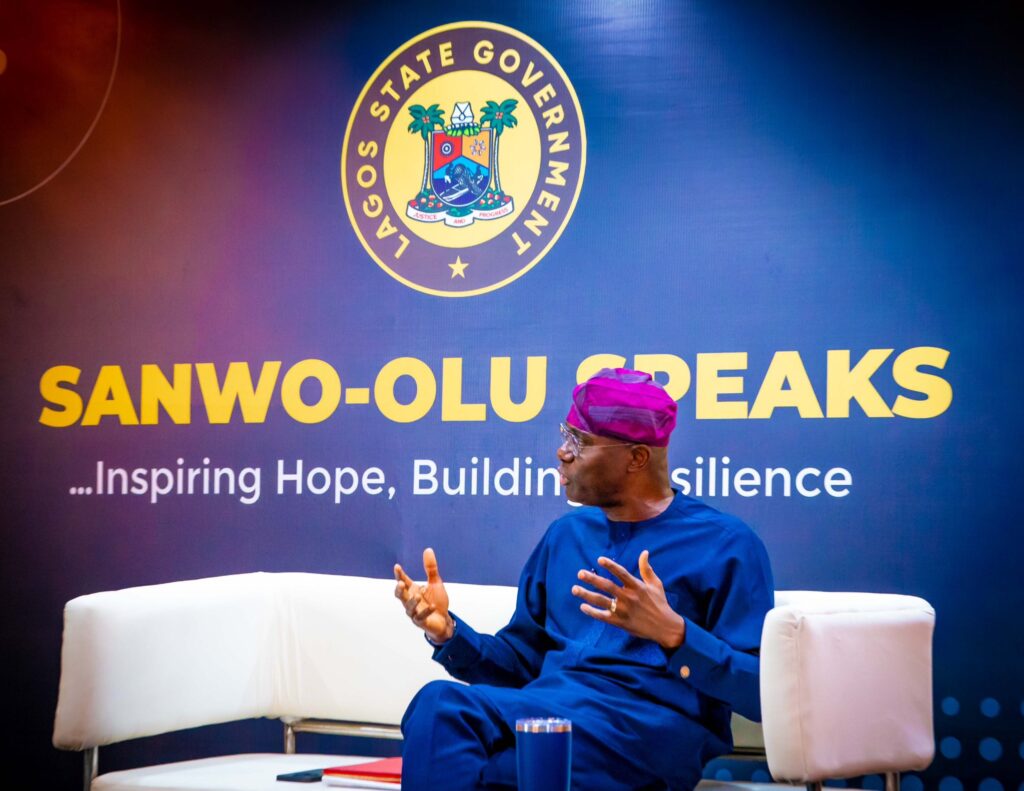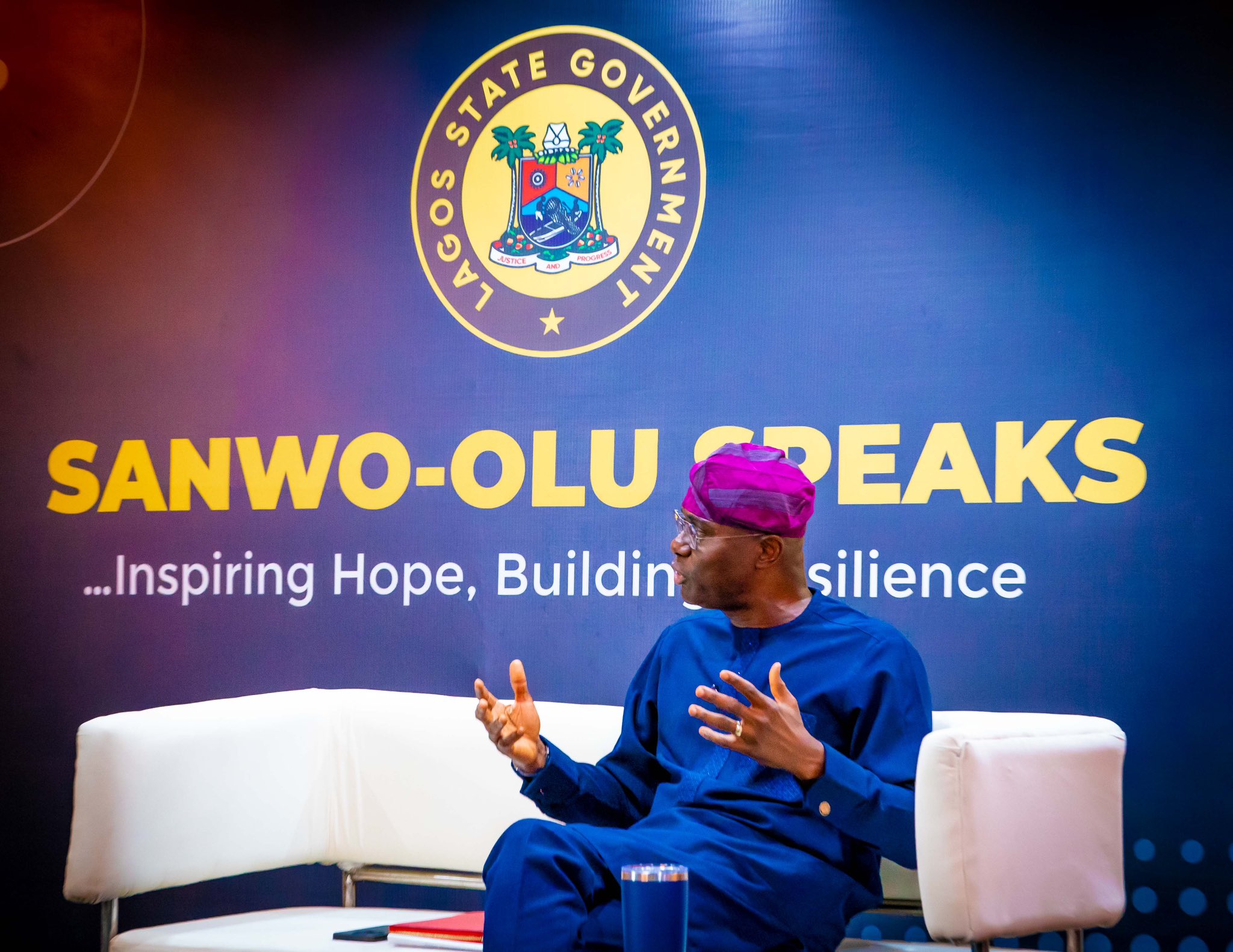By Jide Olaniran

Casting my mind back to the Lagos gubernatorial electioneering campaign and what some of the candidates said, I remember the incumbent, Governor Babajide Sanwo-Olu asking Lagosians whom they would rather call at odd hours or moments of crisis among the candidates vying for the Alausa seat. That question was a trigger of how important it is to choose an empathetic leader, someone who has a proven record of exemplary leadership during a season of crisis; better still, a leader that is trusted and tested.
Managing crisis is not new to Sanwo-Olu. So, when the economic reforms embarked on by President Bola Tinubu-led Federal Government started pushing the citizens to the edge, there was a need to start putting in place palliatives or direct economic intervention programmes by both the Federal Government and sub-national governments to cushion the hardship caused by the reforms.
As a government that promised not to leave anyone behind as it continues to build a prosperous city that welcomes all and sundry, the Sanwo-Olu-led administration took its time to roll out all-encompassing intervention schemes that will touch every household, especially the vulnerable.
The last two months have seen the Lagos State Government roll outverifiable cushioning measures under the umbrella of EKO CARES with some more in the pipeline as Nigerians navigate this trying period with the assurance that at the helm of affairs in the state is a governor who is working with his team and other well-meaning Lagosians to ameliorate the economic hardship.
As the lifeline of the economy at the grassroots, petty traders service the population at the base of the pyramid, so putting money into their hands and business was necessary to inflate the economy through an initiative that empowers them
Lagos Market Trader Money
One of the early beneficiaries of the government interventions were petty traders in the 57 Local Government Areas (LGAs) and Local Council Development Areas (LCDA’s) in the state under the Lagos Market Trader Money financial intervention scheme, N750 million was distributed to 15,000 beneficiaries. The beneficiaries were selected through a methodical process targeted at 200 beneficiaries from markets in each LGA/LCDA in addition to 50 beneficiaries that were selected by the Iyaloja/Babaloja General in each LGA/LCDA making a total of 14,250 market traders.
Also, 750 beneficiaries were identified from markets within the barracks and military formations across the state in collaboration with their respective Iyaloja/Babaloja, bringing the total number of beneficiaries to 15,000.
To ensure fairness in the selection process while demonstrating the spirit of Lagos as being home to all, the beneficiaries were drawn from across all the geopolitical zones of Nigeria. The traditional and new media are awash with testimonies of beneficiaries who received the grant without political, ethnic, or religious influence as the only qualification was to be a market trader who can be verified by government-assigned enumerators.
Transport subsidy
To cushion the effect of the fuel subsidy removal on transportation in the state, Sanwo-Olu during a media chat in February announced a 25per cent reduction in the cost of state public transport services, the Bus Rapid Transport (BRT), Train and Ferry services for those who use the waterways, putting back over ₦500 million monthly into the pockets of Lagosians.
With the Red Line Rail launched, there will be a lot more options for Lagosians just as the state government keeps interfacing with the various transport unions to reduce fares or support with subsidies where needed.
Free healthcare delivery
One of the cardinal palliatives put in place by Sanwo-Olu is in the area of healthcare which can be accessed with little or nothing paid at the state General Hospitals or Primary Health Centres. Over 50,000 women will benefit from the initiative through antenatal treatment, normal delivery, caesarean sessions, free hypertensive medications to individuals in need and some drugs and tests done at a subsidized rate.
The governor has also matched word with action by going unannounced to some of the government-owned hospitals in the state to see if there is an effective implementation of this initiative.
Flexible work policies for public servants
The Lagos State Civil Service is not left out of Sanwo-Olu’s relief programmes as civil servants in the state now enjoy a three-day work week for Levels 1-13 as a means of providing relief and flexibility which reflects the state government’s commitment to the workforce’s well-being, there are also other incentives such as free transportation, discounted food market for the state workforce and the recent announcement by the governor that the retirement gratuity of the state retirees have been paid in order to help the former state employees meet their current financial obligations.
In addition to the aforementioned is the latest gesture by the governor to the state civil servants, which is the moral boosting correction of a longstanding basic salary element of their pay, the correction affects basic, rent and transport and had persisted for six years within the public service.
This adjustment, which is reflected in the March 2024 salary, is a significant milestone that provides fair compensation for the diligent workforce and the Governor is getting accolades for the rectification as workers hail his commitment to their welfare.
The revised salary scale reflects the true earnings due to employees based on their cadres and grade levels.
Food Agro-Hub
As part of hedging Lagos against food insecurity and its attendant challenges a Food Agro-Hub was inaugurated by the governor in Idi-Oro in Mushin LGA, the mid-level food hub will see to the tackling of problems associated with post-harvest losses, inflation, carbon footprint and traffic congestion. To address rising food prices, we will be opening Sunday markets across 42 identified markets across the state to sell food items at really affordable rates. Lagosians will be able to buy commodities, not above the N25,000 threshold. We aim to serve over 500,000 Lagosians with essential food items at rates that defy inflation.
Sitting on 6,400 square meters of land, the food hub has adequate parking space of (3,017sqm) which can accommodate trailers and vehicles and has centralized wet and dry storage areas for bulk buying.
Four more food hubs in Ajah, Agege, Abule Ado and Ikeja are under construction as seven other locations in other LGAs have also been identified for more food hubs to be developed.
The hub opens on Saturdays and Wednesdays and Lagosians can enjoy a 25 per cent discount on every purchase made at the hub.
Ounje Eko
The latest in the series of measures to stem the tide of economic hardship in the state is the Ounje Eko Sunday markets pilot scheme which is located in 57 centres across the state. Foods like garri, beans, rice, bread, egg, onions, pepper and tomatoes are available for purchase at 25 per cent discounted prices, which is less than what obtains in the market.
Although at the initial take-off, there were hitches noticed but most of the identified inadequacies have since been corrected as the market at its debut had some hitches, but most of the identified inadequacies have since been corrected.
To prevent reselling, double-buying and ensure that all buyers were served, children who came with their parents were not allowed to purchase food items while preference was given to the aged, expectant women and people living with disabilities.
A resident, Mr Babalola Onitire, who visited Ounje Eko Grammar school market in Ikorodu, said he could not access any product in the maiden week due to the rowdiness that characterised the process, but “I have come back today and I have had what I wanted for my family at low prices”.
Worthy of mention is the accolade given to Governor Babajide Sanwo-Olu by the Labour Party governorship candidate in Edo State, Olumide Akpata on the Ounje Eko initiative, Akpata who was a guest on a television programme lauded the Lagos State Government for bringing succour to Lagosians at a time that the economy is biting.
The Mama Put option
One of the initiatives that generated diverse reactions from the public after Sanwo-Olu’s media chat highlighting the state’s plan to roll out different palliatives aimed at addressing the sufferings of Lagosians is the dual-win feeding strategy providing thousands of meals over some time by integrating Lagos’ cherished Mama Puts and small-scale community food stalls into the hunger relief efforts.
Through the Mama Put option which is a popular mode and culture of nourishing communities, the local food vendors/caterers will play a vital role in ensuring that targeted groups have access to nutritious meals.
Though yet to take off but being part of the verticals, it will address the concerns of the people, especially at the grassroots and economically empower the heart of Lagos – the Mama Puts and small-scale restaurants. By investing in these businesses, the state is creating jobs and ensuring the disadvantaged have meals which is a win-win strategy for growth and nutrition.
The state government has set up teams to properly use the government registers, community-based groups, and faith-based institutions to reach the targeted groups.
In a bid to achieve its objectives devoid of opacity, Sanwo-Olu inaugurated a Lagos State Special Dispensation ‘Palliative’ Advisory Committee, responsible for all the welfare packages, dual-win feeding strategy, amongst other direct intervention initiatives.
The committee, dedicated to transparency and merit, comprises members selected from major stakeholder groups across Lagos. They include: Imam Abdulazeez Onike, Chief Missioner of NASFAT; Pastor Godman Akinlabi, Senior Pastor of Elevation Church; Hon Seyi Sowunmi, LP Reps member; Mrs Joe Okei-Odumakin; Hon Kolade Alabi; Barrister Taofeeq Ganiu (former PDP Pub Secretary); Dr. Shina Fagbenro-Byron (LP Member, Former DFID official); Hon. Ademola Shabi (Rep, LAHA); Comrade Biliaminu Oba (Youth Representative); Mrs. Kikelomo Bolarinwa, Permanent Secretary, Ministry of LG (Secretary of the committee); Eze Anaba, President, Nigerian Guild of Editors; and Mrs. Sola Salako-Ajulo (Consumer Rights Advocate).
It is believed that these individuals will bring diverse expertise, and their work will be guided by the principles of empathy and dignity as everyone strives to make a significant impact in serving the people.
As this saying goes, if it is not broken why try to fix it, if the state has implemented this kind of initiative successfully during the Covid-19 pandemic shutdown in 2020, then, we should trust the process to deliver the intended goals. Together we shall overcome.
